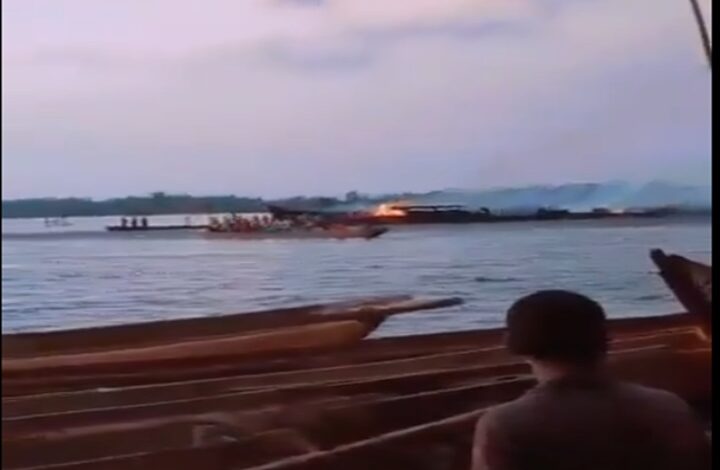Death toll surges to 148 in Congo boat disaster; hundreds missing

Officials confirmed the death toll in Congo’s boat tragedy surged to 148, with hundreds still missing.
The HB Kongolo vessel caught fire and capsized Tuesday near Mbandaka.
Initially, authorities reported 50 fatalities, but Senator Jean-Paul Boketsu Bofili revised the count Friday. Over 500 passengers crowded the boat; survivors face severe burns and scarce aid.

River Commissioner Competent Loyoko attributed the fire to a woman cooking onboard. Panicked passengers, including children, leaped into the river, drowning as flames engulfed the structure.
Rescuers relocated 100 survivors to Mbandaka’s town hall, while hospitals struggled to treat burn victims. “We’re prioritizing critical cases,” a medic stated amid chaotic triage efforts.
Meanwhile, officials acknowledged Congo’s recurring maritime disasters, blaming overcrowding and lax safety laws. Night voyages on rickety boats remain common despite repeated warnings.
In recent years, similar accidents claimed hundreds of lives as communities depend on rivers for transport. Poor infrastructure forces millions to risk dangerous water routes daily.
Local leaders now demand stricter enforcement of capacity limits and safety checks. “Regulations exist but are ignored,” Bofili stressed, urging immediate government intervention.
However, corruption and limited resources hinder progress. Many vessels lack life jackets, fire extinguishers, or trained crew, exacerbating risks during emergencies.
Consequently, survivors and grieving families demand accountability. “We buried 10 relatives today,” a mourner shared, highlighting the trauma gripping affected villages.
The government pledged investigations and aid, yet skepticism lingers. Past promises to improve maritime safety yielded minimal action, residents recall bitterly.
Advocacy groups urge international partners to fund infrastructure projects, reducing reliance on perilous river travel. “Roads could save lives,” an activist emphasized during a rally.
For now, search teams scour the Congo River for bodies as communities mourn. This tragedy underscores the urgent need for systemic change in the DRC.
Senator Bofili emphasized immediate humanitarian needs, citing survivors’ desperate conditions. Aid groups scramble to deliver food, blankets, and medical supplies to shelters.
Competent Loyoko vowed accountability, stating, “We’ll inspect all vessels rigorously.” However, locals doubt authorities’ capacity to enforce such measures long-term.
The Congo River, a lifeline for remote areas, sees daily overcrowding. Passengers often prioritize affordability over safety, boarding dilapidated boats for essential travel.
With infrastructure projects lagging, experts warn accidents will persist. “Without alternatives, people risk their lives daily,” a transport analyst commented.
Grieving families demand compensation and transparency. “We lost everything,” a widow cried, holding her children near the river’s edge.
International bodies expressed condolences, pledging support. The Red Cross deployed teams, yet logistical hurdles delay aid distribution to isolated regions.
Survivors’ testimonies reveal systemic issues: no emergency exits, overcrowded decks, and absent crew training. “We had no chance,” a burn victim whispered.
As discussions on reform gain momentum, activists stress community involvement. “Locals must lead safety initiatives,” a grassroots leader argued during a town hall meeting.
President Tshisekedi addressed the nation, calling the accident “a wake-up call.” He announced a task force to overhaul maritime policies within six months.
Environmental factors compound risks; seasonal rains swell rivers, increasing currents. Overloaded boats face higher capsizing dangers during these periods, yet travel continues.
Education campaigns on safety practices remain sparse. NGOs now plan workshops to teach swimming and emergency response, aiming to empower vulnerable communities.
The HB Kongolo disaster underscores a cycle of neglect and tragedy. Until systemic changes occur, Congo’s rivers will remain perilous pathways for its people.
Post Views: 37





